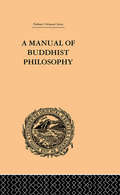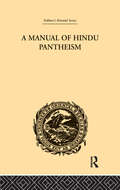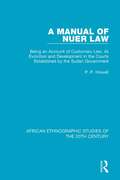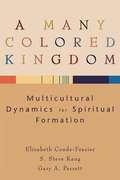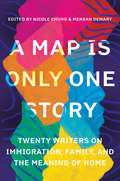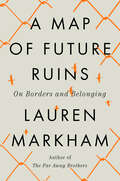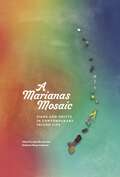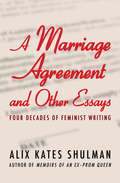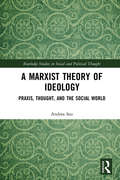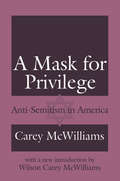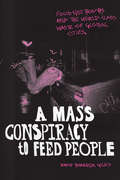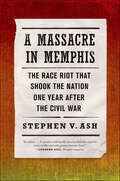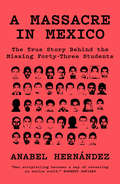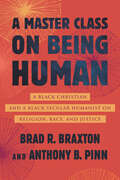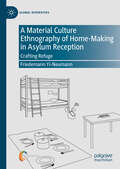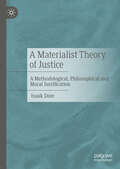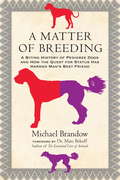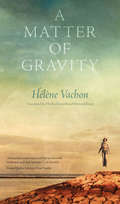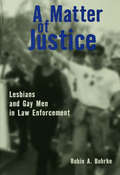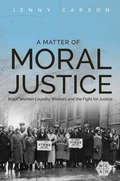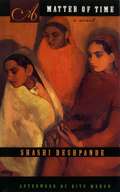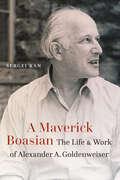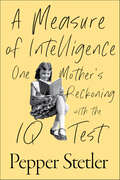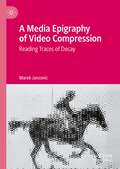- Table View
- List View
A Manual of Buddhist Philosophy: Cosmology
by William Montgomery McGovernThis is Volume VIII of sixteen in a collection on Buddhism. Originally published in 1923, this volume looks at cosmology. All forms of Buddhism, however divergent, claim to have but three objects of worship: the Buddha, the Dharma, and the Sangha.. The first is the founder of the faith, the second the teaching which he gave, and the third the order which he founded. Regarding each of the Ratnas or jewels, as they are called, an enormous amount of speculation has grown up, with many different opinions concerning the proper method of interpretation.
A Manual of Hindu Pantheism: The Vedantasara
by G.A. JacobFirst Published in 2000. Routledge is an imprint of Taylor & Francis, an informa company.
A Manual of Nuer Law: Being an Account of Customary Law, its Evolution and Development in the Courts Established by the Sudan Government
by P. P. HowellOriginally published in 1954 this book was originally designed for administrators but has become a key title for anthropologists. It includes a summary account of the history and social organisation of the Nuer and provides a descriptive analysis of their customary practices concerning homicide, blood-feuds, marriage and divorce and the settlement of disputes by arbitration and the award of compensation. It shows how in the first half of the twentieth century, as a result of administrative action and in particular the establishment of 'Chiefs' Courts' a system of law developed, which although based on customary procedures, introduced many concepts which were quite unknown to the Nuer in the past.
A Many Colored Kingdom: Multicultural Dynamics for Spiritual Formation
by Elizabeth Conde-Frazier S. Steve Kang Gary A. ParrettThe authors describe relevant aspects of their own personal journeys, key issues emerging from their studies and teaching germane to race, culture, and ethnicity; and teaching implications that bring right practice to bear on church ministry.
A Map Is Only One Story: Twenty Writers on Immigration, Family, and the Meaning of Home
by Nicole Chung and Mensah DemaryFrom rediscovering an ancestral village in China to experiencing the realities of American life as a Nigerian, the search for belonging crosses borders and generations. Selected from the archives of Catapult magazine, the essays in A Map Is Only One Story highlight the human side of immigration policies and polarized rhetoric, as twenty writers share provocative personal stories of existing between languages and cultures.Victoria Blanco relates how those with family in both El Paso and Ciudad Juárez experience life on the border. Nina Li Coomes recalls the heroines of Japanese animator Hayao Miyazaki and what they taught her about her bicultural identity. Nur Nasreen Ibrahim details her grandfather&’s crossing of the India-Pakistan border sixty years after Partition. Krystal A. Sital writes of how undocumented status in the United States can impact love and relationships. Porochista Khakpour describes the challenges in writing (and rewriting) Iranian America. Through the power of personal narratives, as told by both emerging and established writers, A Map Is Only One Story offers a new definition of home in the twenty-first century.
A Map of Future Ruins: On Borders and Belonging
by Lauren Markham&“This stunning meditation on nostalgia, heritage, and compassion asks us to dismantle the stories we&’ve been told—and told ourselves—in order to naturalize the forms of injustice we&’ve come to understand as order.&” —Leslie Jamison, author of The Empathy Exams When and how did migration become a crime? Why does ancient Greece remain so important to the West&’s idea of itself? How does nostalgia fuel the exclusion and demonization of migrants today? In 2021, Lauren Markham went to Greece, in search of her own Greek heritage and to cover the aftermath of a fire that burned down the largest refugee camp in Europe. Almost no one had wanted the camp—not activists, not the country&’s growing neo-fascist movement, not even the government. But almost immediately, on scant evidence, six young Afghan refugees were arrested for the crime. Markham soon saw that she was tracing a broader narrative, rooted not only in centuries of global history but also in myth. A mesmerizing, trailblazing synthesis of reporting, history, memoir, and essay, A Map of Future Ruins helps us see that the stories we tell about migration don&’t just explain what happened. They are oracles: they predict the future.
A Marianas Mosaic: Signs and Shifts in Contemporary Island Life
by Ajani Burrell and Kimberly Bunts-AndersonA Marianas Mosaic: Signs and Shifts in Contemporary Island Life features authors in and of the Mariana Islands writing in voices that range from scholarly to poetic about the social, political, and cultural dynamics unfolding across the archipelago. This mosaic of perspectives touches on topics pertinent to contemporary island life including traditional healing, family trauma, sovereignty movements, local clothing brands, multimedia advocacy, spirituality, and more. This collection illuminates the complexity and beauty of the region and provides a deeper understanding of Marianas history and experiences.
A Marriage Agreement and Other Essays: Four Decades of Feminist Writing
by Alix Kates ShulmanA provocative collection of essays by one of the foremost thinkers of second-wave feminismIn a career spanning four decades, Alix Kates Shulman has written on issues ranging from marriage, sex, and divorce to religious identity, age, and family devotion. Throughout her diverse body of work runs a staunch advocacy of equal rights and social justice. Beginning with her provocative essay &“A Marriage Agreement,&” written in 1969, and continuing through to the heartrending &“Caring for an Ill Spouse, and Other Caregivers,&” written in 2011, this collection provides a window into the social movements that defined an era. Witty, stirring, and poignant, A Marriage Agreement and Other Essays illustrates how each generation, in Shulman&’s words, &“can do no more than add its bit to the endless river of consciousness and change.&”
A Marxist Theory of Ideology: Praxis, Thought and the Social World (Routledge Studies in Social and Political Thought)
by Andrea SauThis work explores the question of defining ideology from a Marxist perspective. Advancing beyond the schemas of discussion presented in current Marxist literature, the author offers an account of how the concept of ideology should be defined and what role it plays within historical materialism. Through a close reading of Karl Marx’s relevant writings, this volume demonstrates that while there is no coherent, single account of ideology in Marx’s work, his materialist framework can be reconstructed in a defensible and ‘non-deterministic’ way. The definition of ideology presented is then articulated through a close reading of Antonio Gramsci’s Prison Notebooks. Efforts are also made to demonstrate that Gramsci’s interpretation of historical materialism is indeed consistent and compatible with Marx’s. A systematic articulation of a theory of ideology that combines the works of Marx and Gramsci, as well as adding elements of Pierre Bourdieu’s social theory and William James’s psychology, this volume will appeal to scholars of social and political theory with interests in political economy and Marxist thought.
A Mask for Privilege: Anti-semitism in America
by Carey McWilliams Wilson Carey McWilliamsWhy in America should the most sinister of European social diseases have taken root? Why should that disease have spread from its seemingly anachronistic beginning in the Gilded Age until it infected many of our great magazines and newspapers? Until it determined not only where a man might stay the night, but where he got his education and how he earned his living? This book answers such questions by exposing the myths with which the anti-Semite surrounds his position. By taking away the "mask of privilege" it reveals the source of such prejudice for what it is--the determination of the forces of special privilege, with their hangers-on, to maintain their select and exclusive status regardless of the consequences to other human beings. Like Carey McWilliams's other books on minorities in America, 'A Mask for Privilege' reveals the facts of discrimination so that the fogs of prejudice may be dispersed by the truth. It traces the growth of discrimination and persecution in America from 1877 to 1947, shows why Jews are such good scapegoats, and contrasts the Jewish stereotype--"too pushing, too cunning" with that of other minority groups. Then it looks at the anti-Semitic personality and concludes, with Sartre, that here is "a man who is afraid"--of himself. In his stirring new introduction, Wilson Carey McWilliams calls this a work of recovery "evoking names and moods and incidents now either half-forgotten or lost to memory." This brilliant analysis of anti-Semitism is a documented and forceful attempt to inform Americans about the danger of the undemocratic, antisocial practices in their midst, and to suggest a positive program to arrest a course too similar to that which led to the Holocaust. It transcends majority-minority relations and becomes an analysis of antidemocratic practices, which affect the whole fabric of American life.
A Mass Conspiracy to Feed People: Food Not Bombs and the World-Class Waste of Global Cities
by David Boarder GilesIn A Mass Conspiracy to Feed People, David Boarder Giles explores the ways in which capitalism simultaneously manufactures waste and scarcity. Illustrating how communities of marginalized people and discarded things gather and cultivate political possibilities, Giles documents the work of Food Not Bombs (FNB), a global movement of grassroots soup kitchens that recover wasted grocery surpluses and redistribute them to those in need. He explores FNB's urban contexts: the global cities in which late-capitalist economies and unsustainable consumption precipitate excess, inequality, food waste, and hunger. Beginning in urban dumpsters, Giles traces the logic by which perfectly edible commodities are nonetheless thrown out—an act that manufactures food scarcity—to the social order of “world-class” cities, the pathways of discarded food as it circulates through the FNB kitchen, and the anticapitalist political movements the kitchen represents. Describing the mutual entanglement of global capitalism and anticapitalist transgression, Giles captures those emergent forms of generosity, solidarity, and resistance that spring from the global city's marginalized residents.
A Massacre in Memphis: The Race Riot That Shook the Nation One Year After the Civil War
by Stephen V. AshAn unprecedented account of one of the bloodiest and most significant racial clashes in American historyIn May 1866, just a year after the Civil War ended, Memphis erupted in a three-day spasm of racial violence that saw whites rampage through the city's black neighborhoods. By the time the fires consuming black churches and schools were put out, forty-six freed slaves had been murdered. Congress, furious at this and other evidence of white resistance in the conquered South, launched what is now called Radical Reconstruction, policies to ensure the freedom of the region's four million blacks-and one of the most remarkable experiments in American history. Stephen V. Ash's A Massacre in Memphis is a portrait of a Southern city that opens an entirely new view onto the Civil War, slavery, and its aftermath. A momentous national event, the riot is also remarkable for being "one of the best-documented episodes of the American nineteenth century." Yet Ash is the first to mine the sources available to full effect. Bringing postwar Memphis, Tennessee to vivid life, he takes us among newly arrived Yankees, former Rebels, boisterous Irish immigrants, and striving freed people, and shows how Americans of the period worked, prayed, expressed their politics, and imagined the future. And how they died: Ash's harrowing and profoundly moving present-tense narration of the riot has the immediacy of the best journalism. Told with nuance, grace, and a quiet moral passion, A Massacre in Memphis is Civil War-era history like no other.
A Massacre in Mexico: The True Story Behind the Missing Forty-Three Students
by John Washington Anabel HernandezThe definitive account of the disappearance of forty-three Mexican studentsOn September 26, 2014, a party of students from the Ayotzinapa Rural Teachers’ College were en route to a protest when intercepted by local police. A confrontation ensued. Come the morning, the students were nowhere to be found. The crime that had transpired and the resultant cover-up brought the profound depths of corruption in the Mexican government and police force—as well as the vulnerability of ordinary Mexicans—into stark relief.Investigative reporter Anabel Hernández reconstructs the terrible events of that night and its aftermath, giving us the most complete picture available. Her sources are unparalleled. In researching this book, she secured access to internal government documents that have not been made public and to surveillance footage the government has tried to hide and destroy. Hernández demolishes the Mexican state’s official version of events, which the Peña Nieto government cynically dubbed the “historic truth.” As her research shows, state officials at all levels, from police and prosecutors to the upper echelons of government, conspired to put together a fake case, concealing and manipulating evidence, and arresting and torturing dozens of “suspects,” procuring forced confessions to back up the official lie. By following the role of the various Mexican state agencies through the events in such remarkable detail, A Massacre in Mexico shows with exacting precision precisely who is responsible for this monumental crime and who needs to be held accountable.
A Master Class on Being Human: A Black Christian and a Black Secular Humanist on Religion, Race, and Justice
by Brad Braxton Anthony PinnA conversation between 2 eminent Black thinkers on how to work together to make the world a better place despite deep religious differencesBrad Braxton and Anthony Pinn represent two traditions—Christianity and Secular Humanism respectively—that have for centuries existed in bitter opposition. For too long, people with different worldviews have disparaged and harmed one another. Instead of fighting each other, Braxton and Pinn talk with, listen to, and learn from one another. Their wide-ranging conversation demonstrates the possibility of fruitful exchange that accounts for—rather than masks—their differences.Written amid the Covid-19 pandemic, threats to our democracy, and national protests for racial justice, A Master Class on Being Human shows us that constructive dialogue can help us pursue the common good without sacrificing our distinctive identities. In conversations that are frank, personal, and deeply informed by scholarship, Braxton and Pinn discuss topics that are urgent and immediate, such as the ongoing violence against Black communities, the rise of religiously unaffiliated communities, the Black Lives Matter movement. They also ponder those broader philosophical and theological questions that inform our politics and sense of what it means to be human: the meaning of religion, the stubborn dilemma of moral evil, the power and problems of hope.Braxton and Pinn invite us to join them in a master class as they strive to create a world where differences are not tolerated but instead celebrated. In that kind of courageous classroom, all can learn how to be better people who in turn transform the world into a better place.
A Material Culture Ethnography of Home-Making in Asylum Reception: Crafting Refuge (Global Diversities)
by Friedemann Yi-NeumannThis book explores what it takes to create a sense of home while in exile, drawing on ethnographic research conducted in German asylum reception facilities from 2016-2020. From a material culture perspective, it examines how asylum seekers and migrants with precarious legal status ‘translate’ aspects of home into challenging environments. Through these translations—processual shifts of objects, habits, and ideas across borders—migrants work to reassemble a sense of belonging. The book delves into the material, social, and individual efforts involved in this homing process, while highlighting the ongoing impact of dispossession and loss. By focusing on personal attachments to objects and the broader context of migration, this work offers a unique perspective on forced migration, home cultures, and the quest for ontological security. The book will be of interest to scholars, researchers, and students in disciplines such as anthropology, sociology, and human geography as well as other research interested in ethnographic perspectives on the respective topics.
A Materialist Theory of Justice: A Methodological, Philosophical and Moral Justification
by Isaak DoreThis book presents a comprehensive theory of justice that has a threefold justification. For the first justification, the book presents a rigorously empirical methodology based on the stark realities of the human condition. It has a strong anthropological grounding in that it is adapted from the methodology of cultural materialism which, in turn, is founded on the materialist epistemology of Karl Marx. The second justification is philosophical. The theory of justice derived from the above methodology is further buttressed by and/or tested against the major trends of Western philosophy as represented by the thought of Aristotle, Thomas Hobbes, Thomas Aquinas, Immanuel Kant, Georg W. F. Hegel, John Finnis, John Dewey, George Mead, Jürgen Habermas, Michel Foucault, Jean-François Lyotard, Axel Honneth, Michael Sandel, Michael Walzer, Martha Nussbaum, John Maynard Keynes, Amartya Sen and Karl Marx. The third justification is moral. The promotion of human flourishing on the basis of fairness and equality are the minimum goals to be achieved; after which a more ambitious and comprehensive theory of overall goodness —based on individual and governmental action —can be implemented.
A Matter of Breeding
by Michael BrandowA provocative look at the "cult of pedigree" and an entertaining social history of purebred dogs In this illuminating and entertaining social history, social critic Michael Brandow probes the "cult of pedigree" and traces the commercial rise of the purebred dog. Combining consumer studies with sharp commentary, A Matter of Breeding reveals the sordid history of the dog industry and shows how our brand-name pets--from Labs to French bulldogs and everything in between--pay the price with devastatingly poor health.From the Trade Paperback edition.
A Matter of Gravity
by Howard Scott Phyllis Aronoff Hélène VachonA Matter of Gravity is a playful and touching treatment of illness and tragedy, in which an enigmatic manuscript brings together two disparate male characters. Black humor and compassion brilliantly illuminate their tragic encounter.Hélène Vachon is the author of two novels and more than twenty works of children's literature. Her books have been nominated for many prizes, including the Governor General's Literary Award and the Mr. Christie's Book Award.Howard Scott is a Montreal literary translator who specializes in the genres of fiction and nonfiction.Phyllis Aronoff is former president of the Literary Translators' Association of Canada.
A Matter of Justice: Lesbians and Gay Men in Law Enforcement
by Robin BuhrkeAll too often, gays and lesbians are not accepted by the criminal justice community because of their sexual orientation, and because they are criminal justice personnel, they are not accepted by lesbians and gay men. Written by a past liaison between the Miami Beach Police Department and the lesbian, gay and bisexual community, A Matter of Justice
A Matter of Moral Justice: Black Women Laundry Workers and the Fight for Justice (Working Class in American History #1)
by Jenny CarsonA long-overlooked group of workers and their battle for rights and dignity Like thousands of African American women, Charlotte Adelmond and Dollie Robinson worked in New York’s power laundry industry in the 1930s. Jenny Carson tells the story of how substandard working conditions, racial and gender discrimination, and poor pay drove them to help unionize the city’s laundry workers. Laundry work opened a door for African American women to enter industry, and their numbers allowed women like Adelmond and Robinson to join the vanguard of a successful unionization effort. But an affiliation with the powerful Congress of Industrial Organizations (CIO) transformed the union from a radical, community-based institution into a bureaucratic organization led by men. It also launched a difficult battle to secure economic and social justice for the mostly women and people of color in the plants. As Carson shows, this local struggle highlighted how race and gender shaped worker conditions, labor organizing, and union politics across the country in the twentieth century. Meticulous and engaging, A Matter of Moral Justice examines the role of African American and radical women activists and their collisions with labor organizing and union politics.
A Matter of Time
by Ritu Menon Shashi DeshpandeThe New York Times Book Review called Shashi Deshpande's U.S. debut, "austere, philosophical, and rich; a work that . . . grows in moral force and pathos." Deshpande's critical acclaim in India--including three top literary prizes--prefigured the wide recognition abroad of this pivotal novel, now available in paperback.One morning, with no warning, Gopal, respected professor, devoted husband, and caring father, walks out on his family for reasons even he cannot articulate. His wife, Sumi, returns with their three daughters to the shelter of the Big House, where her parents live in oppressive silence: they have not spoken to each other in thirty-five years. As the mystery of this long silence is unraveled, a horrifying story of loss and pain is laid bare--a story that seems to be repeating itself in Sumi's life.Set in present-day Karnataka, A Matter of Time explores the intricate relationships within an extended family, encompassing three generations. Images from Hindu religion, myth, and local history intertwine delicately with images of contemporary India as the women face and accept the changes that have suddenly become part of their lives.As the women's secrets and strengths are revealed, so are the complications of family and culture, catching each in turn in the cycles of love, loss, and renewal that become essential to their identity. A Matter of Time reveals the hidden springs of character while painting a nuanced portrait of the difficulties and choices facing women--especially educated, independent women--in India today.Shashi Deshpande is the author of seven novels, including The Binding Vine, forthcoming from The Feminist Press and is one of India's most celebrated writers. Her work has been translated into many languages and broadly anthologized.Ritu Menon, a founder of Kali for Women, India's first feminist publisher, has co-edited three anthologies of writing by Indian women.
A Mattress Maker's Daughter: The Renaissance Romance of Don Giovanni De' Medici and Livia Vernazza
by Brendan Dooley"A Mattress Maker's Daughter "richly illuminates the narrative of two people whose mutual affection shaped their own lives and in some ways their times. According to the Renaissance legend told and retold across the centuries, a woman of questionable reputation bamboozles a middle-aged warrior-prince into marrying her, and the family takes revenge. He is Don Giovanni de' Medici, son of the Florentine grand duke; she is Livia Vernazza, daughter of a Genoese artisan. They live in luxury for a while, far from Florence, and have a child. Then, Giovanni dies, the family pounces upon the inheritance, and Livia is forced to return from riches to rags. Documents, including long-lost love letters, reveal another story behind the legend, suppressed by the family and forgotten. Brendan Dooley investigates this largely untold story among the various settings where episodes occurred, including Florence, Genoa, and Venice. In the course of explaining their improbable liaison and its consequences, "A Mattress Maker's Daughter "explores early modern emotions, material culture, heredity, absolutism, and religious tensions at the crux of one of the great transformations in European culture, society, and statecraft. Giovanni and Livia exemplify changing concepts of love and romance, new standards of public and private conduct, and emerging attitudes toward property and legitimacy just as the age of Renaissance humanism gave way to the culture of Counter-Reformation and early modern Europe.
A Maverick Boasian: The Life and Work of Alexander A. Goldenweiser (Critical Studies in the History of Anthropology)
by Sergei KanA Maverick Boasian explores the often contradictory life of Alexander Goldenweiser (1880–1940), a scholar considered by his contemporaries to be Franz Boas&’s most brilliant and most favored student. The story of his life and scholarship is complex and exciting as well as frustrating. Although Goldenweiser came to the United States from Russia as a young man, he spent the next forty years thinking of himself as a European intellectual who never felt entirely at home. A talented ethnographer, he developed excellent rapport with his Native American consultants but cut short his fieldwork due to lack of funds. An individualist and an anarchist in politics, he deeply resented having to compromise any of his ideas and freedoms for the sake of professional success. A charming man, he risked his career and family life to satisfy immediate needs and wants. A number of his books and papers on the relationship between anthropology and other social sciences helped foster an important interdisciplinary conversation that continued for decades after his death. For the first time, Sergei Kan brings together and examines all of Goldenweiser&’s published scholarly works, archival records, personal correspondences, nonacademic publications, and living memories from several of Goldenweiser&’s descendants. Goldenweiser attracted attention for his unique progressive views on such issues as race, antisemitism, immigration, education, pacifism, gender, and individual rights. His was a major voice in a chorus of progressive Boasians who applied the insights of their discipline to a variety of questions on the American public&’s mind. Many of the battles he fought are still with us today.
A Measure of Intelligence: One Mother's Reckoning with the IQ Test
by Pepper StetlerIn a quest to advocate for her daughter, Pepper Stetler uncovers the dark history of the IQ test, leading her to question what exactly we are measuring when we measure intelligence. When Pepper Stetler learned that her daughter, Louisa, who has Down Syndrome, would be required to take periodic IQ tests to secure support in school, she asked a simple question: Why? The hunt for an answer set Stetler on a winding, often dark investigation into how the IQ came to be the "irrefutable" standard for measuring intelligence. Blending a mother's love and dedication to her daughter with incisive historical and cultural analysis, A Measure of Intelligence investigates the origins of the IQ test and its influence on our oppressive culture of high stakes testing. As she unravels the history of the IQ--exposing its roots in eugenics, racism, xenophobia, and ableism--Stetler realizes that the desire to quantify intelligence is closely tied to the desire to segregate society. A Measure of Intelligence is at once a mother's determined quest, a demand for a fundamental reevaluation of how we understand an individual's perceived potential, and a recognition of what we miss when we judge one another by this warped scale.
A Media Epigraphy of Video Compression: Reading Traces of Decay
by Marek JancovicThis book explores the historical interrelationships between mathematics, medicine and media, and offers a unique perspective on how video compression has shaped our relationship with moving images and the world. It situates compression in a network of technological, visual and epistemic practices spanning from late 18th-century computational methods to the standardization of electrical infrastructure and the development of neurology throughout the 1900s. Bringing into conversation media archaeology, science and technology studies, disability studies and queer theory, each chapter offers an in-depth look at a different trace of compression, such as interlacing, macroblocking or flicker. This is a story of forgotten technologies, unusual media practices, strange images on the margins of visual culture and inventive ways of looking at the world. Readers will find illuminating discussions of the formation of complex scientific and medical systems, and of the violent and pleasurable interactions between our bodies and media infrastructure.
